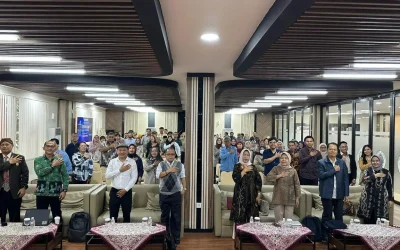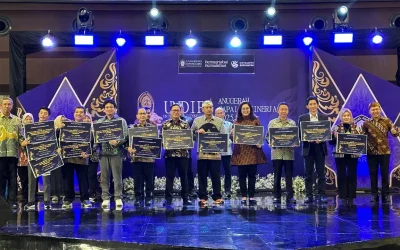Semarang (4/11) – The Department of Business Administration recently held a Guest Lecturer with the theme Quiet Quitting Vs Hustle Culture, Webinar series: Human Resource Strategy. The activity, which took place online via Zoom meeting on Saturday, October 29, 2022, also invited several speakers such as Prof Dr Moeherjono, M.Si (Hang Tuah University, Surabaya), Arik Prasetya, S.Sos, M.Si, Ph.D (Braawijaya University, Malang), and Dr Meilan Sugiarto, S.Sos, Msi (UPN Veteran Yogyakarta). In addition, this Guest Lecturer was moderated by one of the Business Administration lecturers of FISIP Undip, Dr. Hari Susanto Nugroho, M.Si. and attended by the Chairperson of the Department of Business Administration, Dr. Widiartanto, S.Sos, M.AB.
In his remarks, the Chairperson of Business Administration of FISIP Undip said that the webinar was planned to be held in series and there would be several other interesting themes such as financial management, operations management, and human capital. He also hoped that this activity could enlighten and inspire students to find their thesis / final project topics.
Then, Hari Susanto as the moderator of the Guest Lecturer also added that the activity was aimed at obtaining learning related to how to prepare Human Resources (HR) optimally. According to him, Quiet Quitting and Hustle Culture were a dichotomy in the HR sphere. Quiet Quitting was working in human proportions (working soberly). Meanwhile, Hustle culture was how to lead a worker to work as much as possible (workaholic).
Furthermore, Prof Moeherjono in his presentation put more emphasis on explaining Quiet Quitting behaviour. He explained that Quiet Quitting behaviour had long been quite popular among workers in America. One of the factors that encourage changes in Quiet Quitting behaviour was Burnout. The lecturer at Hang Tuah University, Surabaya also mentioned that Quiet quitting was a new toxic in the world of work. Quiet Quitting was considered a disease in the world of work. However, not all employees want to do Quiet Quitting. This behaviour is the opposite of Hustle Culture.
According to Arik Prasetya in his explanation, hustle culture was a new lifestyle among millennials who thought they would be successful if they continued to do work and had little time to rest. The causes of this behaviour included Toxic Positivity, lack of self-awareness, technological development, and social standards. Furthermore, he concluded that hustle culture could cause adverse effects on physical, mental and personal health. Despite working hard, this culture is not the only factor that can determine one’s productivity and work-life balance is a way to reduce the adverse effects of hustle culture.
To close this guest lecturer, Dr Meilan gave a short presentation on the influence of the industrial revolution 4.0 on Quiet Quitting and Hustle culture behaviour. He also said that quiet quitting behaviour and hustle culture would be a choice for anyone.





0 Comments